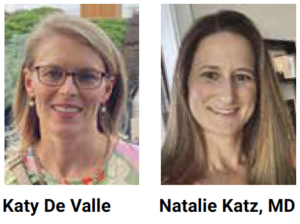MOVE Peds is essential to pave the way
by Natalie Katz, MD, and Katy de Valle, research physical therapist
 More than 50% of people with FSHD develop symptoms as children or teens. When treatments to slow or stop FSHD are approved, common sense suggests that it will be best to treat patients as early as possible to save healthy muscles. Yet obstacles stand in the way of reaching this common-sense goal. Most importantly, data are scarce on how symptoms evolve over time in pediatric populations.
More than 50% of people with FSHD develop symptoms as children or teens. When treatments to slow or stop FSHD are approved, common sense suggests that it will be best to treat patients as early as possible to save healthy muscles. Yet obstacles stand in the way of reaching this common-sense goal. Most importantly, data are scarce on how symptoms evolve over time in pediatric populations.
There have been few studies evaluating the sensitivity of “clinical trial outcome measures,” which are methods to measure whether children on treatment are benefiting compared to those who are untreated. To overcome this challenge, Jeffrey Statland, MD, of the University of Kansas (KUMC), and Ian Woodcock, MD, of Murdoch Children’s Research Institute, are co-leading an international effort to better understand disease progression in childhood-onset FSHD.
This prospective natural history study, MOVE Peds, will be similar to the ongoing MOVE (Motor Outcomes to Validate Evaluations) FSHD study, but specifically designed for children. Initial evaluations will be conducted at seven centers across the US and one in Australia. Additional sites may be added in the future.
What to expect if your child participates
Participants in the study will be seen at six-month intervals for a total of five visits over a 24-month period. At each visit, participants will complete a variety of assessments including: Strength testing, functional measures (mainly consisting of how quickly they are able to complete certain tasks), breathing tests, collection of biological samples for biomarker development, and surveys to capture different aspects of how FSHD affects their lives. One of the most exciting things about this study is that children will also be evaluated using Reachable Workspace and whole-body magnetic resonance imaging – the first time these assessments will be done specifically in children with FSHD.
We anticipate the study will begin enrolling toward the end of 2024. Our goal is to recruit at least 80 children with FSHD who are 5 to 18 years old at the time they enroll. Participants must have genetic confirmation of FSHD as well as clinical symptoms consistent with FSHD to enroll. Many companies are actively developing treatments for FSHD, and several are interested in making these available to children. We hope MOVE Peds will help make this vision a reality.
Where will the study be done?
 IN THE US
IN THE US
To enroll, contact: Michaela Walker (mwalker20@kumc.edu) • Leann Lewis (Leann_Lewis@URMC.Rocester.edu) • Rebecca Clay (rclay@kumc.edu)
- University of Kansas, Kansas City, Kansas
- University of Rochester, Rochester, New York
- Duke University, Raleigh-Durham, North Carolina
- Nationwide Children’s Hospital, Columbus, Ohio
- Stanford University, Palo Alto, California
- University of Utah, Salt Lake City, Utah
- University of Iowa, Iowa City, Iowa
IN AUSTRALIA
To enroll, contact Katy de Valle (katy.devalle@rch.org.au)
- Murdoch Children’s Research Institute, Melbourne


I’m 68 years old, 4 children which 2 are twin girls. My one twin daughter is diagnosed with FSHD but her twin sister not. My eldest daughter aged 37 also diagnosed. Youngest is my son 30 years of age and healthy. But what is the possibility of my children if they get pregnant to carry the chromosome 4 to their children. As far as my knowledge is that the specific gene for FSHD is not been discover yet.
I would appreciate your feedback.
Friendly regards
Sarita van der Merwe, South Africa
What is with people in Europe. Is there place to enroll in Europw? My daughter is 12 an would like to join studies.
Hello
I am Very interested for my 14yo daughter who is diagnosed with fshd I.
I am a doctor , and I could follow her easily.
We are living in France: could you help us please?
Best regards.
I also have a daughter of 10 years old with diagnosed FSHD (<3 repeat D4Z4 units). We live in Denmark and are also looking for places to enroll in such or similar studies.
Do you know of any?